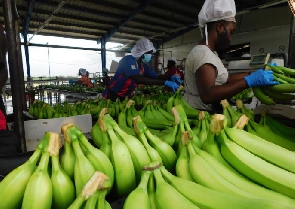Mr Nicholas Gebara, Team Lead of Compete Ghana, has called on exporters to be diligent in their line of duty and stick to the standards of the European market.
He said it was the responsibility of the exporters to make sure that documentation was in place, and also in the supply chain, all raw materials and products being exported conformed to the requirements needed.
“There are requirements in terms of how much pesticides to use, fertilizer to use, the way things are grown organically and inorganically, but there are levels of the requirement to comply to, and it is also the responsibility of the exporter to help farmers comply,” the Team Lead added.
Mr Gebara made the call during the final meeting for key stakeholders in Trade on the National Traceability System and Early Warning Mechanism in Accra, organised by the European Union (EU)-funded Compete Ghana Programme, under the auspices of the Ministry of Trade and Industry.
Compete Ghana engaged relevant agencies in the import and export value chain to improve the existing Ghana-EU early warning mechanism under the Economic Partnership Agreement (EPA).
This was to enable them to generate and disseminate timely and meaningful warning information to enable exporters and agencies in the export and import value chain to identify non-compliant exports to the EU and respond in an appropriate manner.
The Team Lead said the traceability system and early warning mechanism mostly related to the development of systems to enhance the capacity of the public sector to provide the right information and trace products in case they were contaminated.
“This will help to reduce the rejection of Ghana’s food export commodities on the European Union Market,” he added.
Mr Gebara noted that the standards were set by the EU to give assurance and protection to consumers in the market, adding that, “it helps consumers to believe that when they consume products from anywhere in the world, they are safe, and even if something happens, they can trace it back and take measures,” he stressed.
The Team Lead advised farmers and exporters to comply with the EU standards and food safety regulations to avoid warnings and bans on goods exported to the EU.
Mr Prudence Attipoe, Deputy Director, Plant Protection and Regulatory Services Directorate (PPRSD), Ministry of Food and Agriculture, said farmers were registered unto the system with their coordinates and geographical locations of the farm including crops grown.
He added that these were linked with the exporters who were the controllers of the system.
The Deputy Director said each exporter had an interface within the system that they had been trained to use, adding that every activity conducted on the farm was recorded in the system just as good agricultural practices were done on the farm.
“So, we are able to trace every activity done on the farm including planting, weeding, spraying, trapping and harvesting to the park house and to the export zones where our inspectors inspect the items before issuing a Phyto-sanitary certificate for export,” he added.
Compete Ghana symbolically handed over the software for Early Warning Mechanism, E-Phyto and E-Trace to the Ministry of Trade and Industry.
Business News of Saturday, 25 November 2023
Source: GNA
Exporters should be diligent, stick to standards of European market
Entertainment












